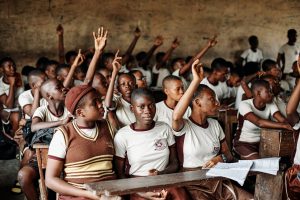Somewhere in Nigeria, a mother sends her eight-year-old daughter on errands.
This chore is what she does daily so no one raises an alarm when she takes a little longer to return.
By evening, she comes back in tears, and further examinations revealed that the girl has been raped by a teenage neighbor.
The parents initially refused to accept an apology from the culprit’s family.
As the days went by, with the victim in police custody, the pleas had turned to threats, and barely three days after the incidents, the father was forced to withdraw the case.
The story doesn’t end with the release of the culprit, however, as traditional leaders within the community had accused the victim’s father of disobeying orders, and sooner than expected, he was ostracized by the community.
Left with the trauma of that incident, this family was forced to put their home on sale to move to another location due to the mounting pressure.
Cases like this are one of the many scenarios that prevent people from speaking up against rape.
It also signifies a case of stigma, a major barrier in addressing sexual abuse in society, precisely rape.

Rape is an unlawful act of intimacy, characterized by lack of consent.
While women and children constitute the highest number of victims, boys, and men, times have shown, have also fallen victim.
UNICEF’s Report on Rape Cases
In Nigeria, one in four women experience sexual abuse before they turn 18 years, UNICEF says. While it is almost impossible to gauge the exact number of rape cases annually in Nigeria, available statistics have shown a prevalence.
The United Nations (UN) estimates that in 2020 alone, 11,200 cases of rape were documented by authorities in Nigeria. This period stands out in Nigeria’s history for exposing the prevalence of this menace. At that time, the federal government had declared a state of emergency over the scourge, directing state governments to also take immediate actions to curb the menace.
Many baffling rape cases also flooded the media space. Women, children, older persons, and even men were all reported as victims. One such shocking case reported during that time was the death of a 22-year-old University student in Benin City, Edo State. The victim, Vera Uwaila Omozuwa was reportedly raped in a church while studying and left with injuries that later led to her death. Nigerians had barely recovered from that shocking event when another teenager, Barakat Bello was gang-raped and hacked to death by her assailants in her home during a robbery.
These cases have continued to occur unabated.
Perhaps, this informed Amnesty International’s viewpoint that the Nigerian Government has failed to live up to the emergency declared during the COVID-19 lockdown.
Recently reported rape cases
In August this year, a four-month-old baby was raped by a 27 years old man in Nassarawa state. The suspect in the case would later confess to the police that he had earlier raped a three-month-old baby, a five-month-old, and a one-year-old toddler at different times.
Many would still recall the case of six months old Khadijah who was raped by a 30-year-old neighbor in Kano State in 2017. Reports indicate that the victim’s mother had entrusted the infant with her best friend to run an errand during which the friend’s husband had taken advantage of the innocent child.
The same year, a 57 years old man was arrested in Katsina State for raping his 11-month-old step-daughter who later died from complications from injuries sustained during the incident.
There are hundreds more of such stories which never make it to the media because they happen within cliquey societies where the culprit largely happens to be a family member or a friend. In these circumstances, families are forced to settle with culprits to ‘save face.’ Some families might not even confront the culprit out of shame, especially if the culprit is an acquaintance.
‘Rather Swept Under The Carpet, Than Discussed’
Stigmas attributed to Sexual Assault Survivors
In Nigeria, we understand that many societies are deeply rooted in their customs. These values, which place a high premium on virginity and chastity make it hard for victims to expose rape. Being raped is considered a shameful predicament in our society. As a result of this many people would rather sweep such issues under the carpet than discuss them.
In a bid to preserve so-called relationships and virtues, the culprit goes scot-free while the victim is forced to suffer the trauma in silence. And having to live with the consequences of such incidents which aren’t limited to teenage pregnancy, Sexually Transmitted Infections(STIs), and psychological trauma. Such twisted mindsets leave the victim at a detriment while empowering the culprits.
Furthermore, in cases where the victim is in a situation of vulnerability, due to either their socio-economic status, educational background, or otherwise, families find it hard to report such cases because of the fear of intimidation or further assault.
We could recall a recent incident in Anambra State, where a teenager was allegedly raped by four men after her father had an altercation with the culprits. Reports indicate that the victim’s father had called out the culprits for certain wrongdoings in their neighborhood, among which included the molestation of young girls. As payback, it was alleged that the four men gang-raped the 13-year-old for what they regarded as ‘her father’s crimes”.
Fast Tracking Progress
We have recognized appreciable progress in the implementation of laws around sexual abuse. Awareness about the roles of authorities such as the police, as well as the increased availability of support services for survivors. However, the refusal of people to support authorities in prosecuting their cases in court remains a challenge.
I recently attended an event for stakeholders working in the Gender-Based Violence Prevention Ecosystem. The event convened to examine the gains of a particular project on Gender-Based Violence Prevention. It identified rape as a major problem that stood out among issues of gender-based violence.
Stakeholders lamented painfully, that when people report rape cases and authorities try to come in to offer support, they are often reluctant to pursue their cases in court. This is because of the fear of stigmatization.
A staff in one of the Sexual Assault Referral Centres in Nigeria had said that many victims in the state came into the center wanting medical assistance. But outrightly refusing to file cases because they don’t want people to know.
The woes of rape survivors are further combined by culprits and their sympathizers, who we find asking questions such as “What was she wearing and why was she there”. There are even reports of culprits claiming that their victims ‘liked the experience or ‘wanted it.’ We have also heard of people getting laughed at by authorities when they go to report rape cases.
To this end, in its last report on rape, ‘Amnesty International, observed that the culture of silence is bred by the fear that society and even authorities will blame them for being raped or their statements discredited. This situation is said to embolden culprits to commit more of such atrocities.
“The fear of not being believed, or even being blamed for being raped, is creating a dangerous culture of silence that prevents survivors from seeking justice. It is unacceptable that survivors of rape and other forms of gender-based violence face such a torturous ordeal to get justice, which only adds to their pain.” the report read.
The Rape and Insurgency Victims Stigmatization Bill
To address this anomaly, a senator representing Niger East Senatorial District at the Nigerian Senate in 2020, proposed a bill to end the stigmatization of rape survivors. The bill, tagged “Rape and Insurgency Victims Stigmatization (Prohibition) Bill 2019,” sought to encourage victims to speak up about rape in court.
Should the bill be passed into law and implemented, rape survivors would be empowered to testify against culprits, without fear of the resultant effect of their actions.
Two years after it was referred to the Senate Committee on Judiciary, Human Rights, and Legal Matters for further legislative work, not much has been heard about the bill.
How many stories would we know before we finally take action?
We have lived with this menace since time immemorial. It is high time we accord it the seriousness it deserves and quit treating this offense with levity. Enough perpetrators have gone scot-free already.
Society, our justice system, and the police have been recognized as culpable, to various degrees, in worsening the woes of rape survivors. Addressing this challenge would require an equal commitment to end the stigmatization of survivors. Who gets to cower in shame is the perpetrator who carries out such dastardly acts, not the victim.






